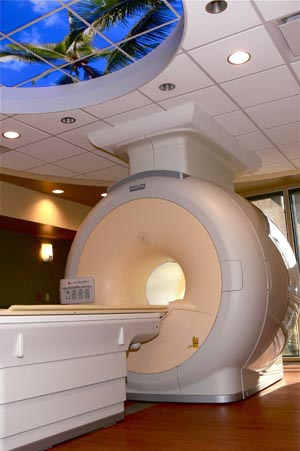CT Scans are available at:

A CT scan -- sometimes called a CAT scan -- is a painless, noninvasive diagnostic procedure that uses a particular kind of X-ray equipment to create cross-sectional images of your body. Think of CT imaging as if you were looking inside a loaf of bread by “virtually” cutting the loaf into thin slices. When the image slices of your body are reassembled by computer software, the result is a very detailed, multidimensional view of your body's interior. The view appears in seconds on a monitor outside the exam room.
How a CT Scan Is Different From an X-ray
Unlike conventional X-rays, which cannot differentiate tissue and internal organs from bone, a CT scan can distinguish tissue, organs and even fat and gas. CT scans help physicians diagnose medical conditions, and they are used as a rapid diagnostic tool for traumatic injuries.
How to Prepare for the Test
- Wear comfortable, loose-fitting clothing to your exam; in some cases, you will be given a hospital gown to wear during the procedure
- You will be given instructions about whether you can eat or drink anything for several hours before your exam
- Take your medication as you normally do, unless your physician has told you otherwise
- Women should always inform their physician and the CT technologist if there is any possibility that they are pregnant
Metal objects can affect the images; before your exam, remove:
- Jewelry
- Eyeglasses
- Dentures
- Hearing aids
- Removable dental work
- Hairpins
If a contrast material, or "dye," will be used in your exam, you might be asked to refrain from eating and drinking for a period of time before your exam. If you have a known allergy to contrast material, your doctor may prescribe medications to reduce the risk of an allergic reaction. Inform your physician of:
- Medications you are taking
- Allergies
- Recent illnesses
- Medical conditions
The Procedure A technologist will help you onto the screening table and make you comfortable. Once the exam begins, you must remain still until it is over. The technologist will leave and go to another room, but will watch you through a glass window and remain in contact with you through an intercom.
During the test, you will lie on a table that passes slowly through the center of a large doughnut-shaped X-ray machine.
Tests usually take less than 30 minutes.
About the Contrast Material
Some CT procedures require a contrast material that consists of iodine or barium, or “dye” (which is actually colorless) to make parts of your body display more clearly. If a contrast material is necessary for your exam, a nurse or technologist will insert an intravenous line into a vein in your hand or arm. In some cases, you will be given a liquid containing the contrast material to drink before the exam. The contrast might give you a hot, flushed sensation followed by a metallic taste in your mouth. This is normal and will pass within a few seconds. If the contrast material is taken by mouth, you might develop diarrhea within a few days as the material leaves your system, especially if it is iodine-based contrast.
In rare cases, some people have an allergic reaction to the contrast. Those with known allergies to iodine or barium need to be especially careful in informing both their physician and the technologists before receiving any contrast material. By having your procedure at a BJC HealthCare hospital, you are assured of being monitored and given immediate treatment if this occurs.
Any unusual symptoms you experience after your receive the contrast -- either during your exam or afterward -- should be reported to the technologist immediately.
If You Have Claustrophobia
If you have claustrophobia (fear of enclosed spaces) or anxiety, ask your physician for a prescription for a mild sedative.
CT Exams for Children
Dress your child in comfortable clothing. Bring along a favorite soft toy or blanket to provide some reassurance.
Your child will be alone in the exam room during the CT scan; however, the technologist will be able to see, hear and speak with him or her at all times. A parent may be allowed in the room, but will be required to wear a lead apron to prevent radiation exposure.
It can be difficult for children to keep still when they are not feeling well, but movement during a CT scan will lower image quality and can cause the exam to take longer. This can lead to even more stress for kids. Because a successful CT scan requires the patient to remain completely still during the exam, some children under 6 might need to be sedated. Reassure your child that sedation is like taking a short nap. An IV needle is inserted in your child's arm in preparation for sedation, but this is usually the worst part of the experience for your child. To help the sedation have full effect, keep your child awake as long as possible prior to the exam. If sedated, your child might remain for observation for up to two hours after the exam.
After the Exam
When your exam is finished and you are ready to leave, a DVD containing your image will be available upon request. It is for your personal record.
People with diabetes might be advised to withhold medication following a CT exam. It is recommended they follow up with their physician.
With the advanced software at BJC HealthCare hospitals, your physician has access to your image and all your clinical information almost immediately. Your images will be read by a radiologist, and your physician will have a full report within 24 to 48 hours. Your physician will contact you with your results.
About Your Bill
You will receive two bills for your exam:
- The hospital bill includes the cost to cover equipment, supplies and technical personnel
- The radiologist’s bill covers the professional reading of your exam